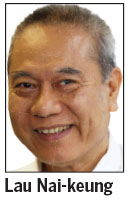Treat Hong Kong for HK's sake or the karma will never end
Updated: 2013-05-22 05:29
By Lau Nai-keung(HK Edition)
|
|||||||
Richard Hughes's Borrowed Place, Borrowed Time: Hong Kong and Its Many Faces must be one of the most mentioned books among the city's intelligentsia. Few take the trouble to read it, but we have all heard of it because the title and especially Hong Kong's "many faces" both past and present are so full of diversified meanings that it is forever intriguing.
For the British and their compradors, Hong Kong was borrowed time because they knew full well that eventually they would have to leave. The strange thing is, although Hong Kong has now been returned to China, and most of us agree that this arrangement is going to be permanent, some people still feel that they are not masters of their own destiny, and live in a piece of borrowed land, so it seems. I express this feeling from the standpoint of a patriot. The dissidents often express similar discontent, but from an entirely different standpoint.
The word "borrowed" was nicely chosen: Hong Kong was not stolen. There was a lender, and that was China. Yes, Hong Kong was forcefully taken away during the Opium Wars, but from 1949 onwards China had quite a number of opportunities to take Hong Kong back.

Two well-documented incidents come to mind: the opportunity in 1949, if pursued, would almost definitely have succeeded, and another opportunity in 1967 that might or might not have borne fruit. But the point is, Hong Kong was always left alone under the principles of "long-term planning and full utilization".
One can argue that the mainland indeed had an "objective" need for keeping the status quo in Hong Kong, for exchange earning and so on. However, we should also recall that those were the days when money was not god and capitalism was not the end of history. In those times people in the mainland believed that their cousins in Hong Kong were suffering within the evil capitalist system. In the language of the day, Hong Kong people were in "deep water and hot fire", which was appalling indeed.
When people in Hong Kong were left in "deep water and hot fire" for 60 years to serve the country's agenda of "long-term planning and full utilization", all the anti-mainland, anti-communist and anti-HKSAR sentiment now prevailing is nothing but karma. If the People's Liberation Army had crossed the Shenzhen River half-a-century ago, we would not be having problems with "One Country, Two Systems" and the Basic Law today.
Of course, the whole thing is complicated by the fact that the heat and the bounty of capitalism turned out to be quite cozy, and our national leaders allegedly wanted to build a few more cities using Hong Kong as a blue print.
Today, Hong Kong is not needed by the mainland for foreign exchange, but some pundits argue that Hong Kong is still serving the country's odd needs. That's why when the patriots in Hong Kong are condemning the dissidents' attempt to thwart the donation to Ya'an in LegCo, the State media did the opposite and reported sympathetically on the dissidents.
For the State media, the opposition against donation in Hong Kong was to be leveraged to push for changes in the mainland's charitable organizations. It was a sort of official response to all the fuss about the accountability of the Red Cross Society of China, which is now a popular topic in the mainland, as a monitoring committee flirted with the idea of reopening the Guo Meimei case (a young woman who flaunted her wealth while saying she was working as a manager at the Red Cross) and Guo threatened to expose more scandals.
Interesting as it is, dissidents in Hong Kong opposed donation not primarily because of the Guo Meimei scandal. The move was part and parcel of Hong Kong's closet independent movement fueled by fascist sentiments, which sees mainlanders as dirt not worthy of assistance. That's why some people in the city, including a "teen model", openly celebrated the death of the earthquake victims.
The Guo Meimei scandal was only an excuse for the dissidents, but our State media bought this excuse, giving them legitimacy. As patriots where should we stand?
If you borrow, you will have to pay back later. If we do not begin treating Hong Kong for Hong Kong's sake, the karma will never end.
The author is a member of the Commission on Strategic Development.
(HK Edition 05/22/2013 page1)